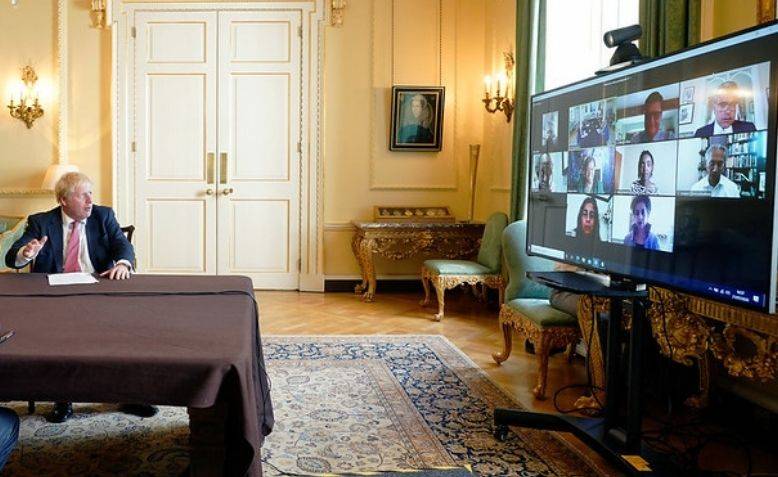 Boris Johnson in a video meeting in July, 2020. Photo: Number 10 / Flickr / cropped from original / licensed under CC 2.0, links at the bottom of article
Boris Johnson in a video meeting in July, 2020. Photo: Number 10 / Flickr / cropped from original / licensed under CC 2.0, links at the bottom of article
Boris Johnson has chosen to up defence spending over the necessary measures to protect lives during a pandemic, writes Lindsey German
Boris Johnson’s announcement of a big rise in defence spending today is partly for domestic consumption. He is desperate to ‘reset’ his government following a series of U-turns and the departure of Dominic Cummings. On one hand, he is trying to impress the incoming US president, Joe Biden, and demonstrate that the UK remains a loyal and devoted ally. On the other, he is attempting to bang the drum for a more ‘patriotic’ approach and please his followers on the right of the Tory party and in the right-wing media.
His claim that ‘defence of the realm’ must be prioritised for spending is typical Johnson hyperbole given that the biggest threat to security and safety for people in Britain right now is Covid-19. A threat has been greatly exacerbated by the repeated failings of his government in dealing with the crisis, meaning that the figures for deaths and infections are among the worst in Europe.
Many will be surprised that this remarkably high increase in defence spending comes at a time of national crisis. It comes at a time where there are supposedly not enough public funds to make hospitals and care homes truly safe, where children are crammed into classes of 30 plus and where frontline staff are being denied decent wages. It will also not go unnoticed that only weeks after refusing to give the poorest children free school meals, and days after a refusal to permanently increase universal credit, the government can find the money to boost an area of spending which already receives excess billions and which is pressing ahead with the phenomenally expensive renewal of Trident.
The boost to the spending of £16.5 billion on top of its annual budget of £41.5 billion – and on top of a Tory manifesto commitment for that budget to rise by 0.5% above inflation every year – was resisted by chancellor Rishi Sunak, who deferred the public spending review, but Johnson has prevailed.
Projects to benefit from the spending include jets for Navy aircraft carriers which will no doubt be directed towards conflict with China in the South China Sea and Iran in the Persian Gulf. Others will be an armed forces ‘Space Command’, which will launch its first rocket in 2022, and a National Cyber Force jointly run by the MOD and GCHQ to oversee offensive cyber operations.
This once again marks the UK out as Europe’s biggest spender on defence and the second-biggest spender in NATO. An analyst from the Royal United Services Institute called it the ‘largest real-terms increase in the defence budget since the early years of the Thatcher premiership, a rise of between 10 and 15% in real terms.’ Meanwhile, overseas aid budgets have been cut. Labour’s shadow defence minister has – shamefully in my view – welcomed the plans.
So, in the face of a pandemic and the greatest crisis since the Second World War with record levels of child poverty, shortages of teachers and nurses, and the worst housing situation for decades, Boris Johnson has chosen to prioritise military spending. Those who face even worse cuts and inequality in the future can be forgiven for not sleeping soundly at this news.
Join Revolution! May Day weekender in London
The world is changing fast. From tariffs and trade wars to the continuing genocide in Gaza to Starmer’s austerity 2.0.
Revolution! on Saturday 3 – Sunday 4 May brings together leading activists and authors to discuss the key questions of the moment and chart a strategy for the left.

